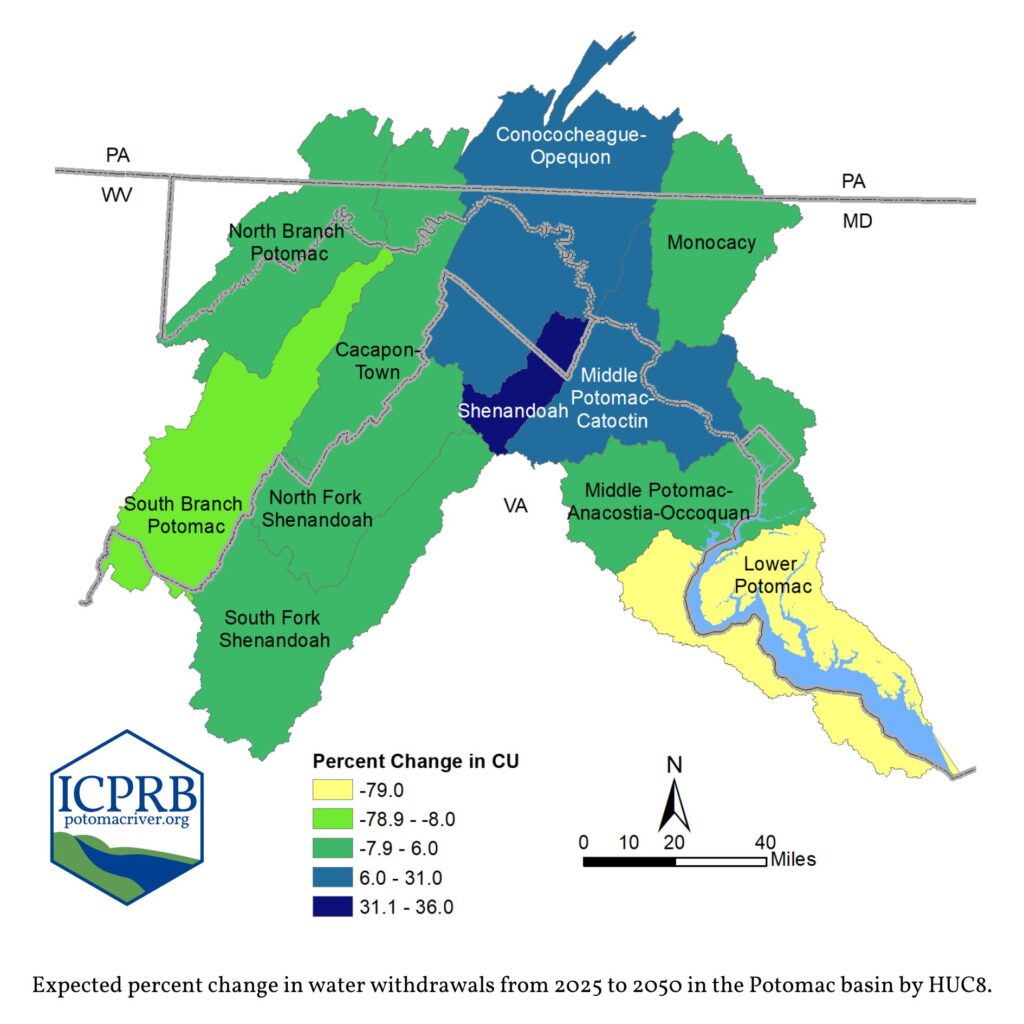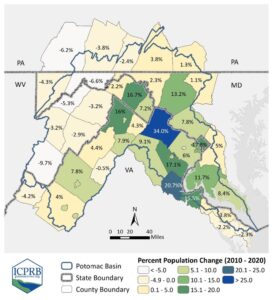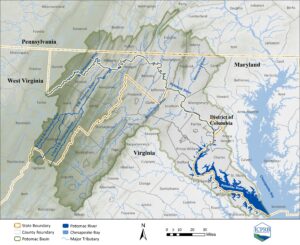ICPRB Commissioners approve updates to the Potomac River Basin Comprehensive Water Resources Plan.
Click here for a PDF of this announcement >>>
The Interstate Commission on the Potomac River Basin (ICPRB) will use this as a tool to protect water supplies, drinking water sources, water quality, and aquatic life, and encourages other organizations to do the same.

Population changes in the Potomac River watershed (2010-2020).
“The Potomac River watershed is home to 6.9 million people. As the saying goes, we all live downstream. Practices and policies throughout the watershed impact our waterways. We expect this updated plan to continue to serve as a catalyst for sustainable water resources management throughout the watershed,” explains Michael Nardolilli, Executive Director of ICPRB.
The plan addresses water resources challenges to the watershed, including sustainable water uses and supplies, protecting and improving water quality, sustainably managing human land use, and protecting ecological health.
The Potomac River watershed includes parts of Virginia, Maryland, West Virginia, and Pennsylvania, as well as the entire District of Columbia. According to Nardolilli, most of the residents in the watershed rely on the Potomac River or its tributaries for drinking water.
The planning document, titled Potomac Basin Comprehensive Water Resources Plan, was originally published in 2018. The 2023 updates were the result of a yearlong review process by an advisory committee composed of regional governments, nonprofit organizations, and academic institutions. It was officially adopted by the ICPRB Commissioners at the business meeting on March 12, 2024.
“The population in the Potomac River watershed has increased by 13% since 2010. With this immense growth, it is more important than ever that we practice smart and sustainable water resources planning. We think this Comprehensive Plan is the tool to achieve that vision,” says Nardolilli.
According to Nardolilli, milestones from the initial 2018 plan are mostly complete. New goals developed in the recent update are expected to begin in the spring of this year.
“It takes a watershed-wide effort to protect and preserve the Potomac River and its related resources. Through a diverse stakeholder group, the plan provides a voice for people and organizations throughout the basin. Further, the update highlights the need to reach the wonderfully varied communities of the basin, with particular focus on those disproportionately affected by water resources issues,” states Dr. Heidi Moltz, Director of Program Operations at ICPRB and an author of the plan.
Dr. Moltz shares some of the ways the public can get involved which are suggested in the new report:
- Encourage and participate in stewardship activities that improve watershed conditions, such as trash pickups, reducing winter salt use, and picking up pet waste.
- Share the plan with local politicians, water suppliers, environmental organizations, and civic organizations.
- Use ICPRB-created tools such as the flow alteration from impervious cover map, the land prioritization tool, and land use webinars to make land use decisions that support sustainable water resources management.
###
FOR IMMEDIATE RELEASE – March 13, 2024
Renee Bourassa, Communications Director
Interstate Commission on the Potomac River Basin | Rockville, MD
rbourassa@icprb.org | 301.417.4371 | ICPRB
The 2023 Updates to the Potomac River Basin Comprehensive Plan can be found on ICPRB’s website at: https://bit.ly/basin_plan
The ICPRB is an interstate compact commission established by Congress in 1940. Its mission is to protect and enhance the waters and related resources of the Potomac River basin through science, regional cooperation, and education. Represented by appointed commissioners, the ICPRB includes the District of Columbia, Maryland, Pennsylvania, Virginia, West Virginia, and the federal government. The ICPRB affirms the importance of fostering diversity equity, inclusion, and justice in all activities. The Potomac belongs to all.




